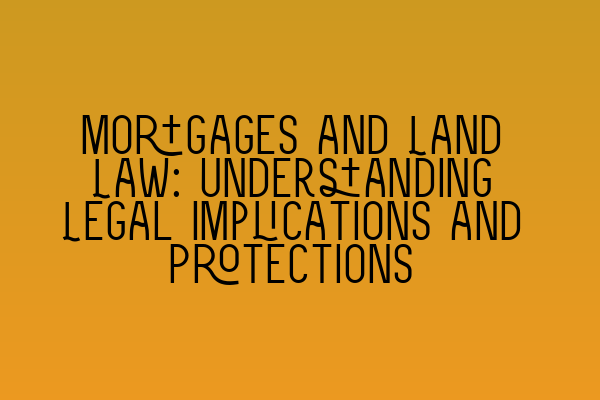Mortgages and Land Law: Understanding Legal Implications and Protections
Welcome to our blog post on mortgages and land law. In this article, we will provide you with a comprehensive overview of the legal implications and protections associated with mortgages. Whether you are a property owner, a potential buyer, or someone interested in the field of property law, this article will equip you with the essential knowledge to navigate the intricacies of mortgages and land law.
Understanding Mortgages
Before diving into the legal implications and protections, let’s begin by understanding what mortgages are. In simple terms, a mortgage is a legal agreement between a borrower and a lender that allows the borrower to obtain funds to purchase or refinance a property, with the property itself serving as security for the loan. In the event of default on the loan repayment, the lender has the right to sell the property to recover the amount owed.
Now that we have a basic understanding of mortgages, let’s explore the legal aspects involved.
Mortgage Laws and Legal Implications
Mortgage laws vary from jurisdiction to jurisdiction, but there are generally common legal implications that apply to most mortgage agreements. These implications include:
- Creation of a legal charge on the property
- Rights and obligations of both the borrower and the lender
- Enforceability of the mortgage agreement
- Foreclosure and repossession procedures
To gain a deeper understanding of these legal implications, let’s examine them one by one.
Creation of a Legal Charge on the Property
A mortgage creates a legal charge on the property, giving the lender the right to seize and sell the property if the borrower defaults on the loan repayment. This charge is usually registered with the appropriate land registry to ensure proper documentation and notice to interested parties. Understanding the creation and registration of this charge is crucial for both borrowers and lenders to protect their rights and interests in the property.
Rights and Obligations of Borrowers and Lenders
Both borrowers and lenders have certain rights and obligations under a mortgage agreement. As a borrower, understanding your rights includes ensuring fair and non-discriminatory lending practices, clear disclosure of terms and conditions, and the right to seek legal advice when needed. Lenders, on the other hand, have the right to receive timely repayments, enforce the terms of the agreement, and take legal action if necessary to recover the outstanding debt.
It is important for borrowers and lenders to familiarize themselves with their respective rights and obligations to avoid any misunderstandings or disputes.
Enforceability of the Mortgage Agreement
For a mortgage agreement to be enforceable, it must meet certain legal requirements. These requirements may include the proper execution of the agreement, compliance with relevant legislation, and the absence of any procedural or substantive irregularities.
Understanding the enforceability of the mortgage agreement helps protect both parties and ensures that their rights are recognized and upheld by the legal system.
Foreclosure and Repossession Procedures
In cases of default on mortgage payments, lenders have the right to foreclose and repossess the property. However, this process must be conducted in accordance with the law and established procedures. Foreclosure and repossession laws vary in different jurisdictions, and it is essential for borrowers to understand their rights and the procedures involved to challenge any unlawful actions by the lender.
Now that we have covered the key legal implications associated with mortgages, let’s move on to discussing the protections available for borrowers.
Legal Protections for Borrowers
Borrowers have legal protections in place to safeguard their interests when entering into a mortgage agreement. These protections may include:
- Disclosure requirements
- Prohibition of unfair lending practices
- Right to seek legal advice and assistance
- Protection against foreclosure abuse
It is essential for borrowers to be aware of these protections and exercise their rights to ensure a fair and equitable mortgage agreement.
Conclusion
Understanding the legal implications and protections associated with mortgages is crucial for all parties involved. Whether you are a borrower, a lender, or simply interested in property law, having a solid understanding of mortgages and land law empowers you to navigate this complex landscape with confidence.
If you would like to further explore related topics and expand your knowledge of contract law, we recommend checking out the following articles:
- Misrepresentation in Contracts: Unveiling Deceptive Practices
- A Closer Look at SQE Contract Law Syllabus
- SQE Contract Law: Analyzing Landmark Cases and Influential Judicial Decisions
- Understanding Contractual Capacity: Rights and Limitations
- Interactive SQE Mock Tests for Contract Law: Test Your Knowledge
We hope that this article has provided you with valuable insights into mortgages and land law. For more information or legal advice on this topic, please reach out to our team at SQE Property Law & Land Law.
Thank you for reading!
